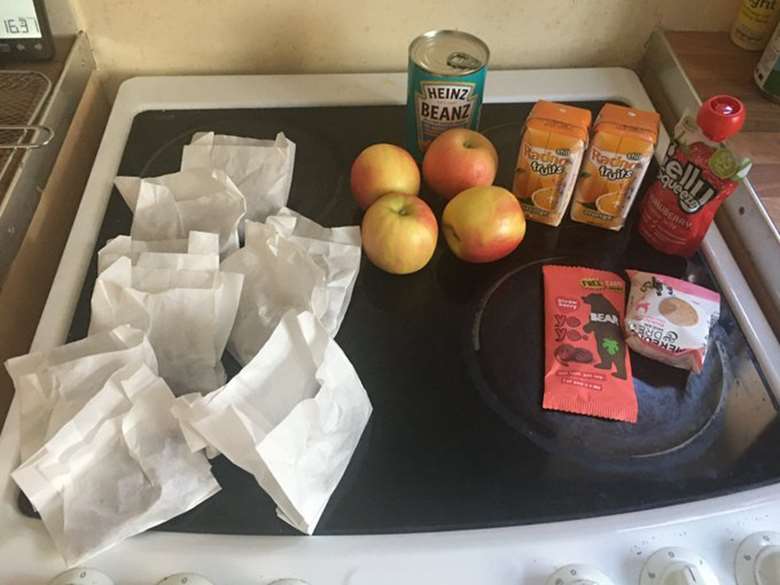DfE launches investigation over ‘woefully inadequate’ free school meals parcels
Ella Doyle and Fiona Simpson
Tuesday, January 12, 2021
Campaigners and Labour politicians have criticised “woefully inadequate” food parcels sent to families eligible for free school meals after images of packages were shared online.

The Department for Education and government-backed catering provider Chartwells have said they are investigating after on image shared by a mother on Twitter showed a parcel supposedly containing £30 worth of food to last for 10 days.
-
Analysis: Holiday hunger funding plans
-
Realted news: Gavin Williamson confirms return of free school meals voucher scheme
It appeared to be comprised of a loaf of bread, some cheese, a tin of beans, two carrots, two bananas, three apples, two potatoes, a bag of pasta, three Frubes, two Soreen bars and a tomato.
#FreeSchoolMeals bag for 10 days:
— Roadside Mum 🐯 (@RoadsideMum) January 11, 2021
2 days jacket potato with beans
8 single cheese sandwiches
2 days carrots
3 days apples
2 days soreen
3 days frubes
Spare pasta & tomato. Will need mayo for pasta salad.
Issued instead of £30 vouchers. I could do more with £30 to be honest. pic.twitter.com/87LGUTHXEu
She wrote: “Public funds were charged £30. I'd have bought this for £5.22.”
Labour’s shadow minister for early years and children, Tulip Siddiq, said: "Images circulating on social media of woefully inadequate food parcels going to families are a serious concern.
"The Department for Education’s investigation must happen immediately so we know where the money is going. We cannot let children go hungry during this lockdown.
"The government must get on and deliver the national voucher scheme it has committed to restarting to ensure that all children are able to get the food they need."
And another one...😔 pic.twitter.com/hCCFCxC5HL
— Marcus Rashford MBE (@MarcusRashford) January 11, 2021
Labour leader Keir Starmer described the situation as a “disgrace”, tweeting: “The images appearing online of woefully inadequate free school meal parcels are a disgrace. Where is the money going? This needs sorting immediately so families don’t go hungry through lockdown.”
Action for Children said: “We're really concerned to see these reports. They help remind us that every family deserves dignity and a decent income with which they can afford the basics in life.”
And another one...😔 pic.twitter.com/hCCFCxC5HL
— Marcus Rashford MBE (@MarcusRashford) January 11, 2021
Meanwhile, England and Manchester United footballer Marcus Rashford who led a campaign to ensure children received free school meals over school holidays during the pandemic shared more images of “inadequate” food parcels.
He said he has spoken to Chartwells, adding: “One thing that is clear is that there was very little communication with the suppliers that a national lockdown was coming. We must do better. Children shouldn’t be going hungry on the basis that we aren’t communicating or being transparent with plans. That is unacceptable.”
He added that Chartwells insisted schools responsible for deciding what was included in food parcels.
DfE said in a statement: “We are looking into this.
“We have clear guidelines and standards for food parcels, which we expect to be followed. Parcels should be nutritious and contain a varied range of food.”
Chartwells said the images shared online “does not reflect the specification for one of our hampers” adding that the company was investigating the issue.
The row comes as a new study shows one in five low-income families have said home learning is more difficult due to a lack of food.
The study by the University of Sussex surveyed more than 3,000 parents in England, Wales, Scotland and Northern Ireland during the first coronavirus lockdown.
The survey aimed to shed light on the impact of lockdown on UK students’ education. As well as the impact of food poverty, it focused on the number of hours during which children were learning at home, which materials schools provided, pupil engagement, motivation and specific difficulties with home learning.
Almost a fifth of pupils eligible for free school meals reported a lack of food made it harder to complete school work compared with just three per cent of wealthier families.
Home learning for poorer pupils is much more likely to be disrupted by a lack of space, internet, technology and other resources, with over a third reporting not having a laptop affecting their education, the survey showed, raising concerns over similar issues amid a third national lockdown.
Dr Matthew Easterbrook, senior lecturer in the School of Psychology at the University of Sussex and the project’s lead researcher, said: “These results show that school closures disproportionately disrupt the education of those who are most economically disadvantaged.”
Lewis Doyle, doctoral researcher in the School of Psychology at the University of Sussex and co-author of the report, added that school closures are “driving further distance between the two groups [disadvantaged and wealthier students]” and may have a knock-on effect for their “future life outcomes”.
“School closures, while clearly necessary during this public health crisis, risk entrenching inequality,” he added.




